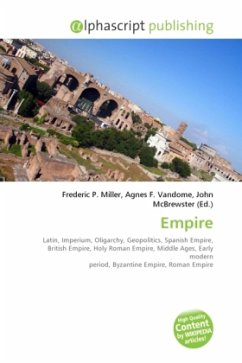The term empire derives from the Latin imperium. Politically, an empire is a geographically extensive group of states and peoples (ethnic groups) united and ruled either by a monarch (emperor, empress) or an oligarchy. Geopolitically, the term empire has denoted very different, territorially-extreme states â at the strong end, the extensive Spanish Empire (16th c.) and the British Empire (19th c.), at the weak end, the Holy Roman Empire (8th c.-19th c.), in its Medieval and early-modern forms, and the Byzantine Empire (15th c.), that was a direct continuation of the Roman Empire, that, in its final century of existence, was more a city-state than a territorial empire. Etymologically, the political usage of empire denotes a strong, centrally-controlled nation-state, but, in the looser, quotidian, vernacular usage, it denotes a large-scale business enterprise (i.e. a transnational corporation) and a political organisation of either national-, regional-, or city scale, controlled either by a person (a political boss) or a group authority (political bosses).
Bitte wählen Sie Ihr Anliegen aus.
Rechnungen
Retourenschein anfordern
Bestellstatus
Storno








